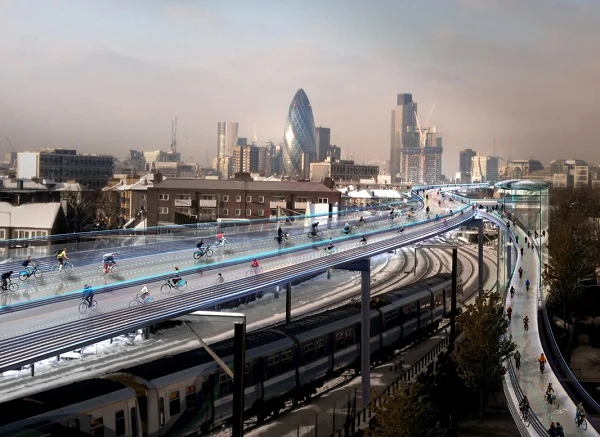It appears to be utterly unrealistic, but isn’t it always thus for a great advance when the idea is first floated?
Anyway, fantasy or not, the SkyCycle system proposed for London – a network of elevated bicycle roadways that would follow existing railway corridors – is too fun not to take a look at it.
The 220-kilometer SkyCycle system comes, in part, from Norman Robert Foster, aka Lord Foster, a 78-year-old British artchitect and, you guessed it, cycling enthusiast. The concept was unveiled last week by Foster’s own Fost + Partners firm with collaborators Exterior Architecture and Spacy Syntax.

image via Foster + Partners
“Lord Foster is a regular cyclist,” the groups said, “who takes part in long-distance tours and is President of Britain’s National Byway Trust, a 3,300-mile network that promotes the health and environmental benefits of cycling by providing safe routes for all abilities across the country – this firsthand knowledge has led to a quest for safe cycling routes in London, where space is at a premium and sometimes bitterly contested.”
The SkyCycle approach would put an end to the conflicts by giving cyclists roads of their own. Doing so above railway lines would offer a host of benefits, the designers said.
First, they said, “Early studies of a SkyCycle system indicate that it provides capacity at a much lower cost than building new roads and tunnels.”
Second, they’d offer attractive cycling: “As London’s railway lines were originally built for steam trains, they follow contours that naturally reduce the amount of energy expended and avoid steep gradients.”
A third item: development possibilities along the routes. “Associated benefits include the regeneration of the typically low value, often underutilised industrial sites next to railway lines; vertically layering the city to create new social spaces and amenities on these cycling high streets; and the integration of automated goods delivery networks,” the designers said.
Fantastical as the idea seems, bursting-at-the-seams London might do well to give it some serious consideration. Driving into London, certainly Central London, is a wildly expensive nonstarter for most people – and the cost of commuting via rail just went up again.
“SkyCycle is conceived … as a network of strategic connections from the suburban edges to the centre, adding the much needed capacity for hundreds of millions of cycle journeys every year with all the social, economic, environmental and health benefits to London that follow,” Space Syntax’s Anna Rose said in a statement.






